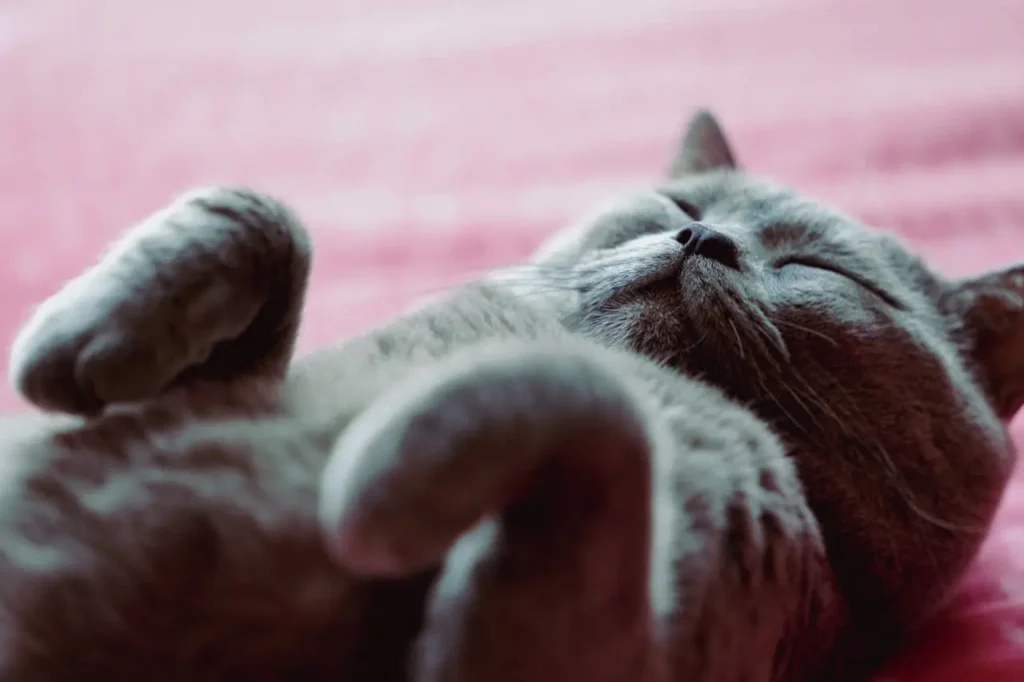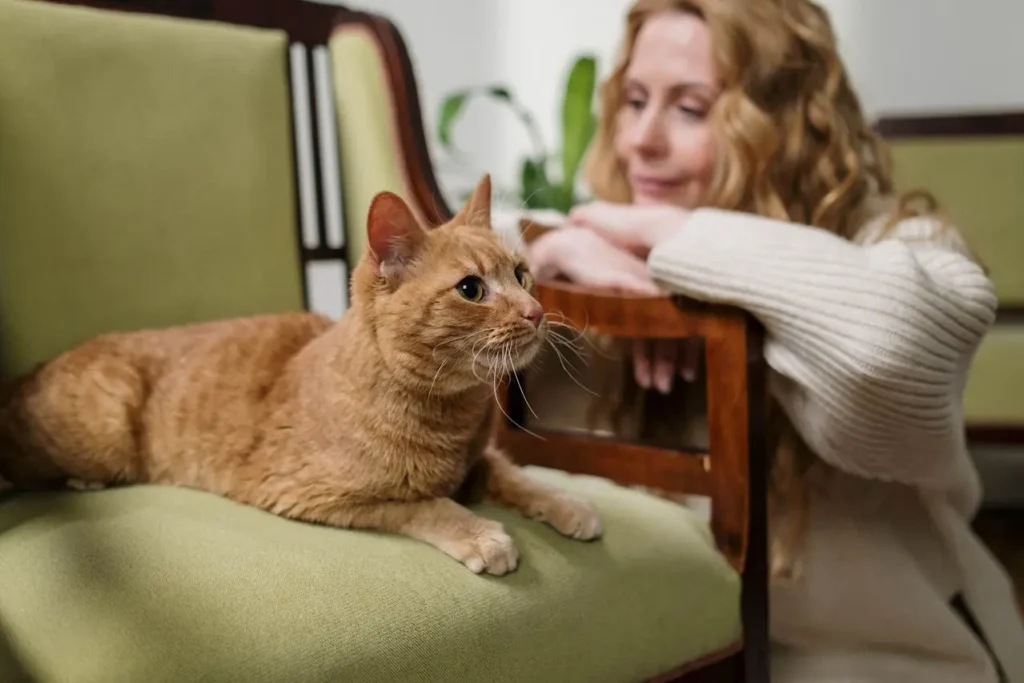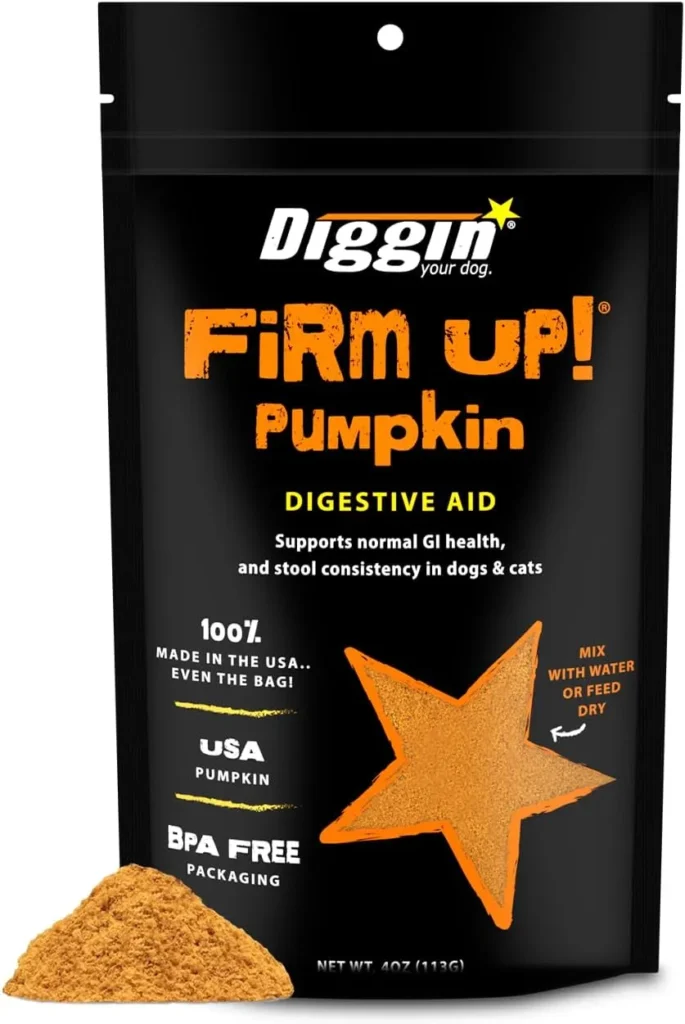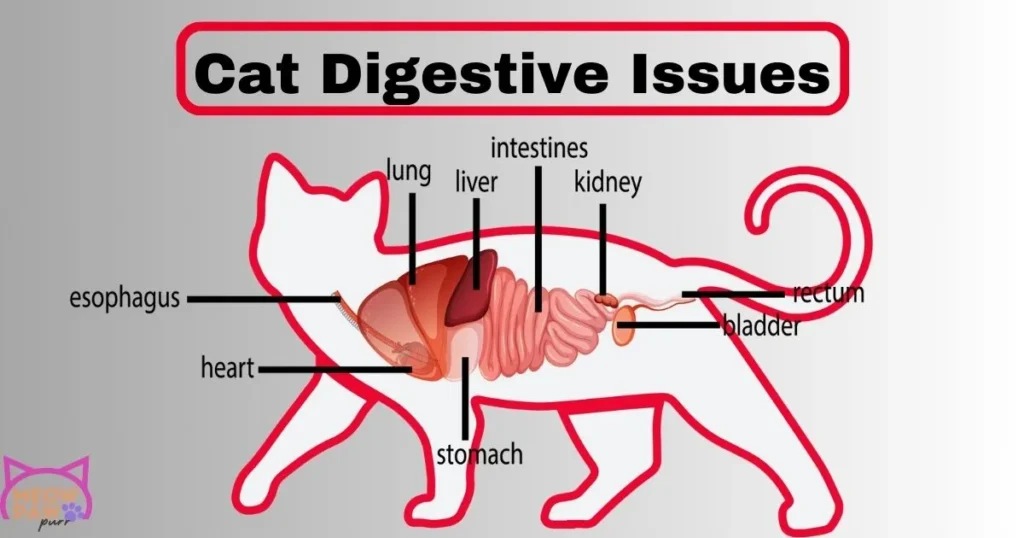As a devoted cat owner, I know the heartache of watching our feline companions struggle with digestive problems. These delicate systems can be easily disrupted. This leads to a range of distressing symptoms that can significantly impact your cat’s well-being. But with the right knowledge and vigilance, we can identify the underlying causes and find effective solutions to restore their digestive health.
Digestive issues in cats can show up in many ways. From the obvious and sudden, like vomiting and diarrhea, to the more subtle and gradual, such as decreased appetite, weight loss, and behavioral changes. While it’s normal for cats to experience the occasional hairball, if it becomes a frequent occurrence, it could be a sign of a larger digestive problem. Understanding the common symptoms and their potential causes is the first step in providing your cat with the care they need.
Common Symptoms of Cat Digestive Issues
Cats can face many digestive problems. It’s important to know the common symptoms. These include vomiting, diarrhea, constipation, and a decrease in appetite. Recognizing these signs helps pet owners take action and care for their cats.
Vomiting
Vomiting is a common sign of digestive issues in cats. It can be due to hairballs, eating things they shouldn’t, or other health issues. If your cat vomits a lot or often, it’s a sign to see a vet.
Diarrhea
Cat diarrhea can mean many things, like food allergies or infections. Keep an eye on how often and what the diarrhea looks like. Also, watch for dehydration or weight loss.
Constipation
Cat constipation is a big problem for cats and their owners. Signs include straining to go, little poop, and less eating. Finding and fixing the cause is key.
Decreased Appetite or Anorexia
If your cat eats less or stops eating, it could be a sign of digestive issues. This might also mean they’re losing weight, feeling tired, and showing other worrying signs. It’s important to act fast.
Weight Loss
Unexpected weight loss in cats can mean Digestive Issues cat. It could be because they’re not absorbing nutrients well, have a health problem, or are eating less. This is something to watch closely.
Abdominal Pain
Cats might show signs of belly pain like tensing up, hiding, or not wanting to be touched there. This could mean they have a digestive problem. A vet should check it out.
Changes in Behavior
Small changes in a cat’s behavior can signal digestive issues. Look for more meowing, less activity, or changes in how they use the litter box. These signs can help you catch problems early.
If your cat shows any of these symptoms, see a vet right away. They can find out what’s wrong and help your cat feel better. Early treatment can stop more problems and make your cat more comfortable.
Hairballs: When They Become a Problem
Hairballs are common in cats, but too many can mean a health issue. If your cat coughs up hairballs more than once a month, it’s time to check. Long-haired cats like Persians and Maine Coons get hairballs often because they shed and groom a lot.
Regular brushing is key to prevent hairballs, especially for long-haired cats. Brushing daily can cut down on the hair your cat swallows. Also, try a hairball management cats diet or supplements to help hair move through their system.
- Older cats are more likely to have hairball problems because they groom more.
- Too much grooming, shedding, and compulsive behaviors can lead to hairballs.
- Severe hairballs can cause constipation, vomiting, less appetite, fever, and tiredness.
- Signs of hairball trouble include hacking, coughing, and gagging in cats.
Hairballs are a common problem but can be serious if not managed. Watch your cat’s grooming and take steps for hairball management cats. This helps keep your cat’s digestive system healthy.
“Hairballs can sometimes lead to severe complications like constipation, vomiting, decreased appetite, fever, and lethargy.”
Dietary Indiscretion and Food Changes
As a cat owner, you might know about the times your cat eats things they shouldn’t. This includes garbage, table scraps, or old food. While it’s less common than in dogs, it can still happen. Symptoms can range from mild stomach upset to severe illness needing vet care.
Switching your cat’s food can also cause digestive problems. Even if it’s to a healthier diet. The cat’s body needs time to adjust. To avoid upset stomach, make any food changes slowly, over 1-2 weeks.
One common issue is cat food allergies. These allergies can lead to vomiting, diarrhea, and weight loss. If you think your cat has a food allergy, work with your vet to find the cause and a new diet.
| Symptom | Potential Causes | Treatment Approach |
|---|---|---|
| Vomiting | Dietary indiscretion, food allergies, infections, medications, underlying health conditions | Antiemetics, bland diet, addressing underlying cause |
| Diarrhea | Dietary indiscretion, food allergies, parasites, infections, medications, stress, underlying health conditions | Fluid support, medications to stop diarrhea, bland diet, addressing underlying cause |
| Decreased Appetite | Digestive issues, food allergies, pain, stress, underlying health conditions | Appetite stimulants, dietary changes, addressing underlying cause |
By paying attention to your cat’s diet and making changes slowly, you can prevent or lessen digestive issues. This ensures your cat stays happy and healthy.
Stress as a Cause of Digestive Issues cat
Stress can really affect a cat’s digestion. Cats like their routine and get upset by changes. This stress can show up as less eating, vomiting, or diarrhea.
Even if stress is the main problem, it’s important to see a vet. Dehydration can happen, even if it’s just from stress.
Identifying and Managing Stress in Cats
Spotting stress in cats is the first step. Look for changes in behavior like hiding more, being aggressive, or grooming too much. Finding out what’s stressing them out is key.
Supplements and Pheromone Diffusers
There are ways to help with stress and Digestive Issues cat. Supplements like Zylkene® and Feliway pheromone diffusers can calm anxious cats. They help cats relax, which can ease digestive problems.
Using these products with other stress-reducing methods can help a lot. It’s a good way to tackle Digestive Issues cat.

“Stress management is crucial in addressing digestive issues in cats. By identifying the sources of stress and utilizing a combination of environmental adjustments and calming supplements, pet owners can help their feline companions find relief from Digestive Issues cat.”
Infectious Causes of Cat Digestive Problems
Digestive issues in cats often come from infections. Young kittens are especially at risk because their immune systems are still growing. Viruses, bacteria, and parasites can harm a cat’s stomach, causing vomiting, diarrhea, and loss of appetite.
Even cats that stay indoors can get sick. They can catch diseases from dirty food, water, or by touching an infected animal. It’s important to take your cat to the vet regularly and use preventive care to keep them healthy.
Common Infectious Culprits
- Feline Panleukopenia Virus (FPV): This virus is very contagious and can make kittens very sick. It causes vomiting, diarrhea, and dehydration.
- Feline Coronavirus (FCoV): Most cats don’t show symptoms, but it can lead to Feline Infectious Peritonitis (FIP). FIP can cause serious health problems, including digestive issues.
- Feline Herpesvirus-1 (FHV-1): This virus affects the upper respiratory tract and stomach. It can cause sneezing, nasal discharge, and stomach problems.
- Intestinal Parasites: Roundworms, hookworms, and giardia can cause diarrhea, vomiting, and poor digestion in cats.
- Bacterial Infections: E. coli, Salmonella, and Listeria can cause food poisoning and digestive issues in cats. Kittens and cats with weak immune systems are at higher risk.
Getting your cat to the vet quickly is key to treating Digestive Issues caused by infections. Keeping your home clean, handling food safely, and deworming regularly can also help prevent these infections.
Inflammatory Conditions Affecting the Digestive Tract
Many cats face digestive problems, but some have serious inflammatory conditions. These include inflammatory bowel disease (IBD) and pancreatitis.
Inflammatory Bowel Disease (IBD)
Feline IBD is a chronic disorder that causes inflammation in the digestive tract. IBD in cats often affects middle-aged and older cats. Symptoms depend on the part of the digestive system affected.
Cats with IBD in the stomach or upper small intestine may vomit often and lose weight. Those with IBD in the large intestine may have diarrhea, mucus, and blood in their stool.
To diagnose IBD, a biopsy is needed. This involves examining a small tissue sample under a microscope. It helps rule out other conditions like cancer or infections.
Treatment for IBD includes drugs and dietary changes. Cats may be given corticosteroids, antibiotics, and immunosuppressive drugs. They may also get prebiotics and probiotics to support their gut health. A highly digestible diet with limited protein sources is recommended.
Managing IBD can be challenging, but proper nutrition and hydration are key. Pain relief is also important for the cat’s comfort.
Pancreatitis
Pancreatitis is another digestive issue in cats. It causes inflammation in the pancreas. The pancreas is crucial for digestion and nutrient absorption.
Diagnosing and treating pancreatitis in cats is hard. Symptoms can be vague and similar to other digestive disorders. Proper veterinary care and dietary changes are vital for managing this condition.
Toxins, Medications, and Their Side Effects
Digestive problems in cats can come from toxic substances or medication side effects. Common culprits include sugar-free gum and antifreeze. Even pet meds can harm a cat’s stomach.
Aspirin, paracetamol, and ibuprofen can cause vomiting and bleeding in cats. Antifreeze and fertilizers can lead to serious stomach issues. Rodenticides and insecticides can cause diarrhea and muscle tremors.
Even vet-prescribed meds can upset a cat’s stomach. Antibiotics and anti-inflammatory drugs can cause nausea and constipation. Chemotherapy and anesthesia can also affect digestion.
While rare, severe side effects from meds can happen. Watch your cat for digestive signs after starting a new drug. Talk to your vet if you notice any issues.
Preventing toxic substance access and managing meds is crucial for your cat’s health. Stay alert and work with your vet to keep your cat’s digestive system healthy.
Intestinal Blockages: A Serious Concern
Intestinal blockages are a serious issue for cat owners. They happen when something blocks food and fluids in the digestive tract. This is often because a cat swallowed something like a toy or string.
Symptoms include vomiting, not wanting to eat, feeling tired, and drooling. If not treated, blockages can cause sepsis, a deadly infection. Quick vet care is needed, as surgery is usually required to fix it.
Preventing Intestinal Blockages
To avoid the pain of an intestinal blockage, prevent it. Here’s how to keep your cat safe:
- Watch your cat closely during play to stop them from swallowing small things like toy parts or strings.
- Groom your cat often to cut down on hair swallowing, which can cause blockages.
- Feed your cat a high-fiber diet to help digestion and bowel movements.
- Make sure your cat always has clean, fresh water to drink.
By being careful and watching your cat, you can lower the risk of a serious blockage. Early action and treatment are crucial for your pet’s health.

Constipation in Cats: Causes and Management
Constipation is a common problem in cats of all ages. It’s more common in overweight, inactive cats or those with health issues like kidney disease. Symptoms include straining, less waste in the litter box, hard stools, and abdominal pain.
If your cat has trouble going to the bathroom often, your vet might suggest a special diet or supplements. Drinking enough water is key to prevent hard stools. Overweight cats face a higher risk of constipation due to colon pressure.
Many factors, like lifestyle and health problems, can lead to constipation. Obstructions, like tumors or swallowed objects, can also cause it. If your cat hasn’t gone in over 3 days, see a vet.
To prevent constipation, make sure your cat drinks plenty of water. Add wet food to their diet and encourage play. Keep the litter box clean and schedule vet visits. Being proactive can keep your cat happy and healthy.
| Statistic | Value |
|---|---|
| Cats should have a bowel movement daily to every other day | – |
| Constipation in cats is identified if a cat hasn’t used the litter box in 3 days or more | – |
| Inadequate water intake can lead to hard and difficult to pass stool in cats | – |
| Overweight cats have a higher risk of constipation due to added pressure on the colon | – |
| Obstructions in the colon, such as tumors or swallowed foreign objects, can also cause constipation in cats | – |
| If a cat hasn’t had a bowel movement in over 3 days, it’s recommended to consult a veterinarian | – |
By addressing cat constipation quickly and making lifestyle changes, you can help your cat stay healthy. This prevents future problems.
Underlying Health Conditions and Digestive Issues
Many digestive problems in cats come from diet or environment. But, health issues like kidney disease and thyroid disorders can also play a big role. These are especially common in older cats.
Kidney Disease and Thyroid Disorders
As cats get older, they face more risks of kidney disease and hyperthyroidism. These conditions can cause vomiting, diarrhea, and weight loss. These symptoms can really hurt a cat’s digestive health.
It’s very important to find and treat these health problems. This is the key to fixing the digestive issues they cause.
Cancer and Its Impact on the Digestive System
Cancer, especially lymphoma, can badly hurt a cat’s digestive system. Lymphoma often attacks the intestines, causing symptoms like food allergies or inflammatory bowel disease (IBD). Tumors in the digestive tract or elsewhere can also cause digestive problems.
For cats with cancer, the best plan is to treat the cancer and help with digestive symptoms. This approach can really help.
Keeping your cat’s digestive health in check is a big job. Health problems can show up in many ways. Working with your vet to find and manage these issues is key. This way, you can help your cat feel better from digestive problems.
Conclusion
Digestive issues are common in cats, caused by many things like diet and stress. Recognizing signs and getting vet care quickly helps keep your cat healthy. This ensures your feline friend stays well.
A cat’s stomach is very acidic, and digestion takes 10 to 24 hours. A balanced diet with quality protein and water is key. Adding prebiotics, fiber, and exercise also helps their gut and nutrient absorption.
In 2022, 29% of North American homes had cats, making Digestive Issues cat a big concern. Knowing about the cat gut microbiota and chronic enteropathies helps manage their health. Being informed and proactive helps your cat live a happy, healthy life.
FAQ
What are the common clinical signs of digestive issues in cats?
Signs include vomiting, diarrhea, and constipation. Cats may also show a decrease in appetite or weight loss. Fever, dehydration, and abdominal pain are other symptoms. Changes in behavior can also indicate digestive problems.
When do hairballs become a problem for cats?
Hairballs more than once a month need attention. Brushing long-haired cats daily helps. Special diets or supplements can also help move hair through their system.
What is a dietary indiscretion, and how can it affect a cat’s digestive system?
Eating things they shouldn’t, like garbage, can upset a cat’s stomach. This is less common in cats than dogs. Symptoms range from mild to severe. Slowly introducing new foods helps prevent upset.
How can stress affect a cat’s digestive system?
Stress can lead to vomiting, diarrhea, or decreased appetite. Cats prefer routine. Stress can cause dehydration, so seek vet care if symptoms persist. Supplements and Feliway can help manage stress.
What types of infections can cause digestive problems in cats?
Young kittens are most at risk of infections. But any cat can get sick. Regular vet visits and preventive care are key.
What are some inflammatory conditions that can affect a cat’s digestive tract?
Food allergies, sensitivities, and IBD can cause problems. Pancreatitis can also lead to poor digestion. A specific diet and supplements may be needed for treatment.
How can toxins, medications, and other substances affect a cat’s digestive system?
Eating harmful foods or substances can upset a cat’s stomach. Toxins can also harm other parts of the body. Even vet-prescribed medications can cause stomach upset.
What is an intestinal blockage, and how can it affect a cat?
An intestinal blockage stops food and fluids from moving. It often requires surgery. Symptoms include vomiting and not eating or drinking. Preventing blockages is crucial.
What are the causes and management of constipation in cats?
Constipation is common in overweight, inactive cats. Symptoms include straining and dry stools. A special diet, supplements, and increased water intake may help.
How can underlying health conditions contribute to digestive issues in cats?
Kidney disease and thyroid issues can cause digestive problems. Lymphoma and cancer can also affect the digestive system. Treatment depends on the condition.

Diggin’ Your Dog – Firm Up Pumpkin for Dogs & Cats – Fiber Supplement with Pumpkin & Apple Fiber for Cat & Dog Digestive Support – Made in USA, 4 oz


Good web site! I truly love how it is easy on my eyes and the data are well written. I am wondering how I could be notified whenever a new post has been made. I’ve subscribed to your RSS which must do the trick! Have a nice day!
i will fix it